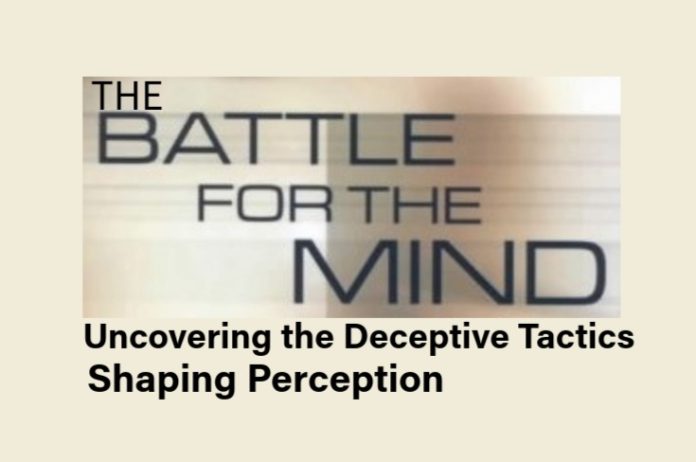– Adv. Shahid Usman Ali
In an age flooded with information and influence, the human mind has become a battleground for various entities seeking to shape perceptions and control behavior. From the pervasive reach of the entertainment industry and mass media to the subtle manipulation of pharmaceutical companies and the education system, and the ever-present surveillance and data collection mechanisms, our understanding of reality is constantly under siege. We must delve into the deceptive tactics employed by these entities to control perceptions and minds and explore strategies for cultivating critical thinking and reclaiming autonomy.
The entertainment industry and mass media hold immense power in shaping societal narratives and influencing individual perceptions. Through carefully crafted content, they dictate what is considered normal, desirable, or taboo, perpetuating certain ideologies and values while marginalizing others. One of the primary ways in which the entertainment industry exerts control is through the promotion of idealized lifestyles and beauty standards. By glamorizing wealth, fame, and physical perfection, they create a culture of aspiration and inadequacy, leading individuals to chase unattainable ideals and perpetuating a cycle of consumption and dissatisfaction.
Similarly, mass media outlets wield significant influence over public opinion and political discourse. Through selective reporting, biased narratives, and sensationalism, they manipulate reality to serve their agendas, perpetuating misinformation and polarizing society. The rise of echo chambers and filter bubbles further exacerbates this problem, creating insulated communities that reinforce existing beliefs and shield individuals from dissenting viewpoints.
Pharmaceutical companies play a pivotal role in shaping perceptions of mental health and well-being. By tampering with common emotions and experiences, they create a market for their products, turning human suffering into a profitable enterprise. Through aggressive marketing tactics and the dissemination of biased information, they promote the use of psychotropic drugs as a quick fix for complex psychological issues, perpetuating a culture of overmedication and dependency. Moreover, pharmaceutical companies often downplay potential side effects and risks associated with their drugs, leading consumers to underestimate the dangers and overestimate the benefits.
The education system plays a crucial role in shaping young minds and molding future generations. However, it is not immune to external influences seeking to control perceptions and promote certain ideologies. From standardized testing to curriculum design, every aspect of education is subject to manipulation by vested interests. One of the most insidious ways in which the education system perpetuates deception is through the omission of uncomfortable truths from textbooks and classroom discussions. By sanitizing history and whitewashing the past, it perpetuates a false narrative of national pride and exceptionalism, erasing the voices of marginalized communities and perpetuating systems of oppression.
In the digital age, our every move is tracked, analyzed, and monetized by surveillance and data collection mechanisms operated by tech giants and government agencies. From social media algorithms to facial recognition software, our data is harvested on an unprecedented scale, with far-reaching implications for privacy and autonomy. This constant surveillance not only erodes our sense of freedom but also shapes our perceptions of reality. By feeding us personalized content based on our online behavior, algorithms create echo chambers that reinforce existing beliefs and shield us from dissenting viewpoints. Moreover, the commoditization of personal data reduces individuals to mere commodities, valued only for their potential to generate profit.
The first step towards free will is to cultivate critical thinking and question everything, especially information that comes from sources with vested interests. Instead of accepting information at face value, interrogate its origins, motives, and potential biases. Look for corroborating evidence from multiple sources and consider alternative perspectives before forming conclusions.
Media literacy is essential for navigating the deluge of information and misinformation in the digital age. Learn to discern credible sources from unreliable ones, and critically evaluate the content you consume. Look for indicators of bias, such as loaded language, sensationalism, and cherry-picked evidence, and be wary of information that aligns too neatly with preconceived notions or ideologies.
To avoid falling into echo chambers and filter bubbles, actively seek out diverse perspectives and dissenting viewpoints. Engage with individuals who hold different beliefs and opinions, and be open to challenging your assumptions. Exposure to diverse perspectives not only broadens your understanding of complex issues but also fosters empathy and tolerance. Take time to reflect on your thoughts and emotions, and observe how external influences shape your perceptions and behavior. By developing greater self-awareness, you can better resist manipulation and make informed choices aligned with your values and principles.
The deceptive influence of the entertainment industry, mass media, pharmaceutical companies, the education system, and surveillance and data collection mechanisms poses a significant threat to individual autonomy and critical thinking. By understanding the tactics employed by these entities and cultivating mindfulness, media literacy, and a willingness to question authority, individuals can reclaim agency over their perceptions and minds. In an age of rampant deception and manipulation, critical thinking is not just a skill; it is a survival mechanism essential for safeguarding the integrity of the human mind, so think while it’s still legal.




